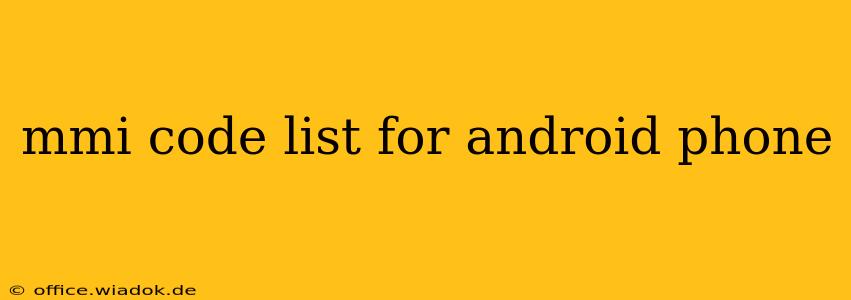Android phones, with their vast capabilities, offer a hidden world of functionality accessible through MMI codes (Man-Machine Interface codes). These short codes, typically beginning with *#, allow quick access to diagnostic information, hidden settings, and even troubleshooting tools without needing any additional apps. This guide explores a range of useful MMI codes for Android, categorized for easy navigation. Note that the availability of specific codes may vary depending on your phone manufacturer (Samsung, Google Pixel, etc.), Android version, and your carrier.
Understanding MMI Codes
MMI codes are essentially shortcuts to various functions within your phone's system. They bypass the usual interface and directly access specific features or data. While some codes are universally recognized, others are carrier-specific or depend on your device's firmware. Always exercise caution when using MMI codes, as some could potentially alter settings if used incorrectly.
Essential MMI Codes for Android
This section focuses on the most commonly used and useful MMI codes for Android devices:
Device Information Codes:
-
*#06#: This universally recognized code displays your phone's IMEI (International Mobile Equipment Identity) number. The IMEI is a unique identifier for your device, useful for tracking, warranty claims, and reporting theft. -
*#1234#or*#*#4636#*#*: These codes (or variations thereof) often provide access to detailed phone information, including battery statistics, Wi-Fi information, and usage statistics. The exact information displayed can vary depending on your phone and Android version. -
*#0*#: This code frequently initiates a hardware test, checking components like the touchscreen, LCD display, keypad, and other sensors. This can be helpful in diagnosing hardware issues.
Network & Connectivity Codes:
*#*#225#: (Often, this one needs the # at the end for the entire string) This code may display the network signal strength and related information, providing insight into your connection quality. Availability may vary depending on your carrier.
Troubleshooting Codes:
*#*#7378423#*#*(or similar variations): This code, sometimes referred to as the Service Menu, might reveal more in-depth information about your phone's hardware and software. The exact contents of this menu are highly device-specific. Use this with caution.
Important Note: Many MMI codes are not standardized across all Android devices. The behavior or even availability of a given code can change based on your device's manufacturer, carrier, and Android version. If a code doesn't work as expected, it likely isn't supported on your particular phone.
Carrier-Specific MMI Codes
Many MMI codes are specific to your mobile carrier (like Verizon, AT&T, T-Mobile, etc.). These codes often provide access to carrier-specific services like voicemail, data usage information, or account details. Contact your carrier directly to obtain a list of codes relevant to your plan and device. Your carrier's website or support documentation will be the best resource for this information.
Safety Precautions When Using MMI Codes:
-
Back up your data: Before using any unfamiliar MMI codes, it's always wise to back up your important data to prevent accidental loss.
-
Proceed with caution: Avoid entering codes you don't understand or that haven't been verified as safe from a reputable source. Incorrectly using certain MMI codes could lead to unexpected or undesirable consequences.
-
Consult your carrier or manufacturer: If you encounter any problems or uncertainties, contact your mobile carrier's technical support or your phone manufacturer for assistance.
This guide provides a starting point for exploring the world of MMI codes on your Android phone. Remember that exploring these codes responsibly and with caution is essential to avoid unintended issues. Always double-check the validity of any code before using it, and consult your carrier or manufacturer's support resources for specific guidance related to your device and service.

